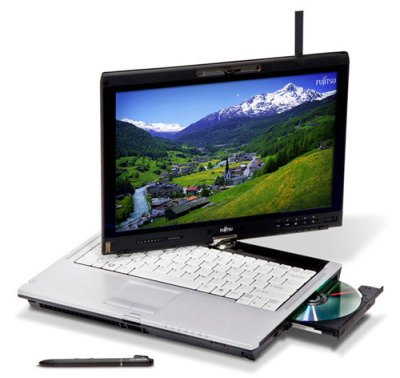
Fujitsu has announced its new LifeBook T5010 convertible tablet PC, featuring a multitouch-capable 13.3-inch WXGA display, with an optional dual digitizer designed to support touch-based featured coming in Windows 7. With the dual digitizer, users will be able to perform two-fingered action for common tasks like scrolling, panning, zooming, and rotating objects and media on screen; the T5010 also sports a modular bay that can be used to hold a second hard drive, optical drive, or extra battery.
“The LifeBook T5010 convertible tablet PC represents our initial offering in a line of dual digitizer convertibles that take advantage of the advanced capabilities of the anticipated Windows 7 operating system,” said Fujitsu America’s senior director of mobile product management Paul Moore, in a statement. “The benefit of touch is that it’s intuitive and practical. Consumers, mobile professionals, and students will immediately see the value and convenience it adds to the computing experience.”
The LifeBook T5010 weighs about 4.5 pounds, and features an 2.4 GHz Intel Core 2 Duo processor, 1 to 2 GB of RAM, 80 to 12 GB of hard drive storage, and a modular DVD±RW DVD writer. The units also pack gigabit Ethernet, an integrated webcam and mic, Bluetooth and 802.11a/b/g/n wireless communications, and integrated security features like a smart card reader, trusted platform module, security panel, and fingerprint sensor. The T5010 also features a spill-resistant keyboard, and features a bidirectional swivel hinge for converting between a tablet and a notebook. Wireless broadband options are also available from AT&T and Verizon Wireless.
The LifeBook T5010 is available now, with prices starting at $1,759, and $1,859 with the dual digitizer. The units run Windows Vista Business now, but we expect Fujitsu will offer Windows 7 as soon as Microsoft pulls the trigger in October.
Editors' Recommendations
- The best Windows tablets for 2024
- AMD, please don’t make the same mistake with the Ryzen 7 7700X3D
- This Amazon Fire tablet deal is cheaper than a steak dinner
- Demand for PCs will stay strong in 2021, but the future doesn’t look as bright
- Windows 10 tablet mode isn’t disappearing, but it’s now harder to find


